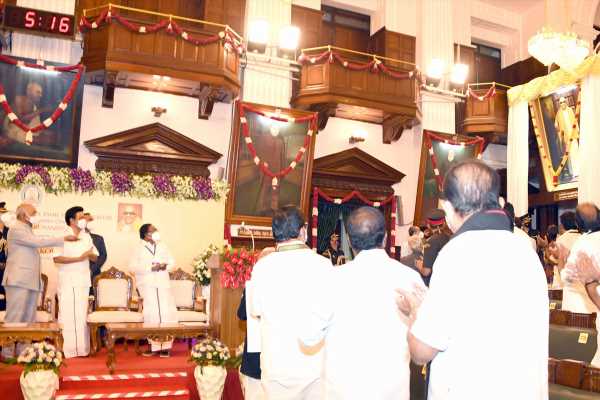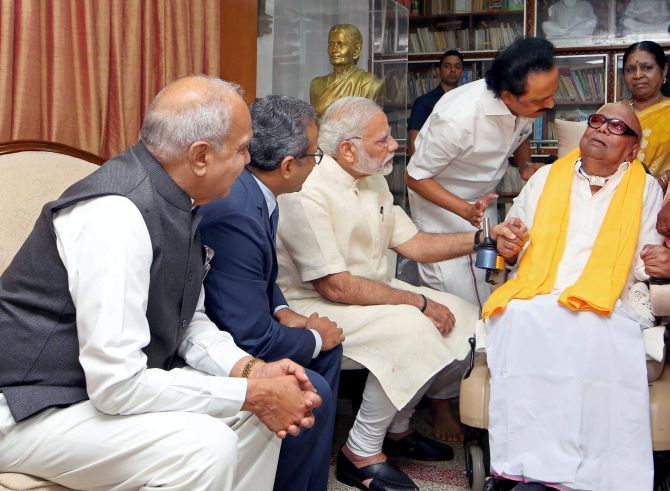‘He had given tools to fight all forms of homogenisation.’
“In 2004 Karunanidhi realised that a state party could play a larger role in national politics, so he played a key role in forming the UPA,” A S Panneerselvan, author of the book Karunanidhi: A Life, tells A Ganesh Nadar/Rediff.com in the concluding segment of a two-part interview.
- Part 1: ‘There is no space for national parties in Tamil Nadu’
When Mr C N Annadurai passed away, you don’t see anything wrong in Karunanidhi becoming chief minister though there were others senior to him in the DMK (Dravid Munnetra Kazagham)?
What Annadurai passed away, the notional number two was V R Nedunchezhiyan and Karunanidhi was the real number two. Political parties generally go to leaders that can deliver and not on seniority.
Karunanidhi could deliver and that is why he emerged.
What were the real reasons for MGR leaving the party (M G Ramachandran, the Tamil movie superstar left the DMK and founded the rival All India Anna Dravida Munnetra Kazagham)?
There were three reasons. One was his personal ambition; the second was that the Union government wanted him to break the party. The third reason was Karunanidhi’s younger son M K Muthu entering movies. This made him feel insecure.
How did Karunanidhi hold the DMK together for 13 years when MGR was chief minister?
MGR won the assembly elections in 1977. In the 1980 Lok Sabha elections the DMK won and the MGR government was dismissed. But MGR came back to power on the sympathy wave. After that the DMK won the local body elections.
In the 1984-1985 elections Indira Gandhi was assassinated and MGR was in hospital in the United States. There was a sympathy wave for MGR and the Congress.
Though MGR won on his own in 1977, the other two he won owing to derivative reasons. So Karunanidhi did have power as a popular support throughout. This helped him keep his party together.
Would you say the only real difference between the DMK and the AIADMK was the personalities heading them, not the policies?
I don’t think so. The AIADMK is more willing to accept national parties. The AIADMK likes to work with the central government. That is why the ADMK changed to All India ADMK.
The DMK’s accent is on state autonomy. The AIADMK doesn’t confront the Centre. That is clear in issues like NEET.
Rajiv Gandhi’s assassination in Tamil Nadu went against the DMK so badly, yet how did Karunanidhi come back to power after such a major setback?
The years 1991 to 1996 are very crucial to understanding what really happened. By 1996 people knew that the DMK had nothing to with the assassination.
Tamil Nadu politics and Sri Lanka politics was separated in the DMK when Vaiko (V Gopalswamy) left the party in 1993 (to launch the Marumalarchi DMK).
1996 was the first election after liberalisation. Karunanidhi’s ability to deliver on the industrial front, on the economic and social fronts helped him come back to power.
Though the public perception was that Vaiko left the DMK because M K Stalin was being groomed as the heir, were there other reasons?
Stalin emerged as a big leader; Vaiko emerged as a smaller leader.
There have been so many Dravidian splinter groups but none has come close to matching or replacing the two majors. Why is it so?
I don’t think there were too many splits. The first split was in 1961, it was led by E Sampath who merged with the Congress. Other splinter groups merged either with the DMK or the AIADMK.
They were trying to find political space which they could not.
Did Karunanidhi really stymie G K Moopanar’s chances of becoming prime minister during United Front rule between 1996 and 1998?
I was reporting that development. Karunanidhi was willing to help Moopanar, but others said that he is a Congressman and that went against him.
How did Karunanidhi manage to be part of both the Vajpayee and the Manmohan Singh governments? That must have called for some deft footwork.
Joining Vajpayee was not an easy decision for the DMK. They joined in 1999. The Congress had said they don’t want a coalition government in their Pachmarhi declaration.
The DMK could not support the Congress because they had used the Jain Commission report to destabilise the I K Gujral government.
The DMK government had been dismissed twice in 1976 and 1991. Vajpayee had refused to listen to Jayalalitha to dismiss the Karunanidhi government. These were the reasons for the DMK to join Vajpayee.
In 2004 Karunanidhi realised that a state party could play a larger role in national politics, so he played a key role in forming the UPA. Sonia Gandhi was supported as a leader by Karunanidhi and Laloo Prasad Yadav. In 2004 regional players had a bigger role in the UPA.
Was the DMK the tilting factor for the Congress to come back to power in 2004?
The DMK played a big role — no doubt about it. They won all 40 seats in Tamil Nadu in 2004. That helped in the formation of the UPA government.
In 2006, when the DMK won the elections, would it have made a difference if Karunanidhi had made Stalin the chief minister like Mulayam Singh made Akhilesh Yadav in UP in 2012?
I don’t think so, as Karunanidhi was still the most visible face of the DMK. Even now Stalin is working with many senior leaders of the party.
How will you sum up Karunanidhi’s political legacy?
Karunanidhi’s legacy is retaining the plurality of India. He had given tools to fight all forms of homogenisation.
Many believe that Stalin doesn’t have his father’s political acumen. What is your reading?
On what basis are they saying that? Those who are saying this are much junior to him in politics. Stalin was arrested during the Emergency. He must be more senior than most of our national leaders.
In 2021 he retained all his allies. The other alliance could not do this. That shows his political acumen.
Should Stalin have brought in his son Udhaynidhi into electoral politics? Has the DMK officially turned into a dynastic party?
Udhaynidhi is already 44 years old, at which age Karunanidhi became chief minister. Second and third generation leaders are there in all parties including the DMK. People are not looking at your lineage; they are looking at what you are going to deliver. Birth is not an issue with the Tamil Nadu voter.
After reading your book I know of all the good qualities of Karunanidhi. What about his flaws, surely you must have found some?
In 2006 he gave more seats to the alliance partners. He didn’t get a majority on his own and needed to depend on outside support. Despite years of experience this was a judgemental error.
The second judgemental error was when 2G happened there was nobody to defend them in New Delhi. M K Azhagiri could not do it as he was inarticulate.
Source: Read Full Article



